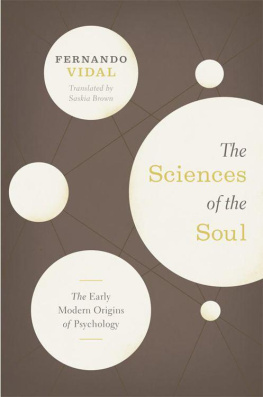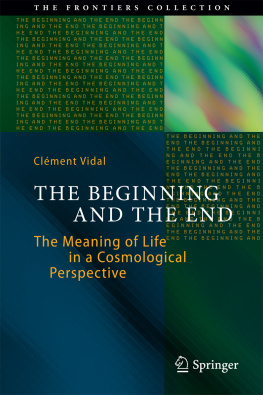Fernando Vidal - Being Brains: Making the Cerebral Subject
Here you can read online Fernando Vidal - Being Brains: Making the Cerebral Subject full text of the book (entire story) in english for free. Download pdf and epub, get meaning, cover and reviews about this ebook. year: 2017, publisher: Fordham UP, genre: Religion. Description of the work, (preface) as well as reviews are available. Best literature library LitArk.com created for fans of good reading and offers a wide selection of genres:
Romance novel
Science fiction
Adventure
Detective
Science
History
Home and family
Prose
Art
Politics
Computer
Non-fiction
Religion
Business
Children
Humor
Choose a favorite category and find really read worthwhile books. Enjoy immersion in the world of imagination, feel the emotions of the characters or learn something new for yourself, make an fascinating discovery.

- Book:Being Brains: Making the Cerebral Subject
- Author:
- Publisher:Fordham UP
- Genre:
- Year:2017
- Rating:5 / 5
- Favourites:Add to favourites
- Your mark:
- 100
- 1
- 2
- 3
- 4
- 5
Being Brains: Making the Cerebral Subject: summary, description and annotation
We offer to read an annotation, description, summary or preface (depends on what the author of the book "Being Brains: Making the Cerebral Subject" wrote himself). If you haven't found the necessary information about the book — write in the comments, we will try to find it.
Being Brains: Making the Cerebral Subject — read online for free the complete book (whole text) full work
Below is the text of the book, divided by pages. System saving the place of the last page read, allows you to conveniently read the book "Being Brains: Making the Cerebral Subject" online for free, without having to search again every time where you left off. Put a bookmark, and you can go to the page where you finished reading at any time.
Font size:
Interval:
Bookmark:
Being Brains
 Stefanos Geroulanos and Todd Meyers, series editors
Stefanos Geroulanos and Todd Meyers, series editors

Copyright 2017 Fordham University Press
All rights reserved. No part of this publication may be reproduced, stored in a retrieval system, or transmitted in any form or by any meanselectronic, mechanical, photocopy, recording, or any otherexcept for brief quotations in printed reviews, without the prior permission of the publisher.
Fordham University Press has no responsibility for the persistence or accuracy of URLs for external or third-party Internet websites referred to in this publication and does not guarantee that any content on such websites is, or will remain, accurate or appropriate.
Fordham University Press also publishes its books in a variety of electronic formats. Some content that appears in print may not be available in electronic books.
Visit us online at www.fordhampress.com.
Library of Congress Cataloging-in-Publication Data
Names: Vidal, Fernando, author.
Title: Being brains : making the cerebral subject / Fernando Vidal and Francisco Ortega.
Description: First edition. | New York, NY : Fordham University Press, 2017. | Series: Forms of living | Includes bibliographical references and index.
Identifiers: LCCN 2016050792 | ISBN 9780823276073 (cloth)
Subjects: LCSH: Philosophical anthropology. | Human beings. | Brain.
Classification: LCC BD450 .V463 2017 | DDC 128dc23
LC record available at https://lccn.loc.gov/2016050792
Printed in the United States of America
19 18 17 5 4 3 2 1
First edition
for Bethnia and Luisa
FO
for Nicole
FV
CONTENTS
How did the idea that humans are essentially their brains become thinkable? Why should it be considered a creed and not the articulation or corollary of a proven scientific fact? How is it expressed in notions and practices across a wide variety of domains in many contemporary societies? Does it really fashion peoples lives, and if yes, how and to what extent? These are the basic questions this book seeks to explore.
It is no news that since the Decade of the Brain of the 1990s, the brain has become a major focus of attention. Starting in the following decade, that focus became itself the object of considerable interest to scholars in human sciences such as anthropology, disability studies, history, and sociology, who have delved into aspects of what has been variously called the neural turn, the neuro-turn, and the neuroscientific turn. While these labels sometimes refer to academic developments in the human sciences themselves (for example, the appearance of neuroanthropology, neuroeducation, neurolaw, neurotheology, and others), they apply to a more widespread phenomenon. Neuroscientific research has attracted lavish funding in North America and Europe; the World Health Organization considers neurological conditions one of the greatest threats to public health; and while it still speaks of mental health, successive directors of the U.S. National Institute of Mental Health, the worlds largest scientific organization in the area, have insisted that mental disorders must be understood and treated as brain disorders. Beyond research and the clinic, the brain and neuroscientific information form the core of a vast universe that ranges from crassly commercial enterprises to lofty metaphysical speculations. Within that universe, the undisciplined multiplication and the often comical abuse of the prefix neuro- are like the small signals that confirm the existence of a large-scale phenomenon.
Over the years, in the course of presenting, individually or together, the topics that make up the present book, we have been complimented for being critical of the neural turn in matters of personhood, culture, and societyalmost as much as we have been accused of being against the neurosciences or neuroimaging methods, of refusing fruitful interactions between the brain sciences and the human sciences, or of exaggerating the impact of the neuro in contemporary society. ( Neuro is not the reification of anything but only a concise way of designating the universe discussed in this book.) Since we risk being again in the same position, let us, to begin with, try to be clear.
Beyond considerations about the intrinsic value of knowledge, how could anyone be against sciences and methods that demonstrate that a large number of persons diagnosed as being in a vegetative state may have minimal consciousness or against investigations that may contribute to the understanding and treatment of dementias or crucially strengthen what we know about the dramatic developmental effects of deprivation? We are, if anything, for them. But we could certainly be described as being against some of the most extravagant claims and some of the most injudicious applications of the neuro . We cannot be convinced that beauty is definable as a quality in objects that correlates with activity in the medial orbitofrontal cortexor that such a definition can serve as the basis for assessing individual artworks or explaining aesthetic experience. Nor do we think that neurobiological approaches, whether inspired by conviction or by opportunism, are always appropriate or even relevant to account for complex human phenomena. Basically, we do not take the neuro as something that comes naturally, and we question most interpretations of the commonplace according to which The mind is what the brain does .
Such a stance grew firmer in the course of our research, and it informs our account. Since the early 2000s there has been a considerable amount of work done by historians and social scientists from various disciplines on the rise, forms, and functioning of the neuro in contemporary culture. We have profited from it, but we do not deal with the history and sociology of the neurosciences, unravel the dynamics of biopolitical governmentality as such, or disentangle the many ways in which the neuro may represent technocratic ideals or accord with neoliberal precepts of choice, flexibility, self-care and personal responsibility (Cromby and Williams 2011, 217; see also Cooter 2014, Maasen and Sutter 2007, Pitts-Taylor 2010). Rather, we examine the roots of the notion that, as persons, humans are in principle reducible to their brains as well as some of that notions main conceptual and practical forms, developments, and implications (related terms, such as neurocultures and cerebral subject , will appear and be explained later). Although we do not explicitly explore the potential biopolitical repercussions of the neurosciences or the life-science boom in political theory (Meloni 2012), Being Brains is political in the general sense that it deals, selectively but consistently, with processes that touch on peoples lives, the constitution of subjectivities, and the distribution of power within societies. Its overarching political dimension concerns ways in which the neuro becomes involved in the government of the living, informs interventions in human lives, and participates in processes of subjectivation (Rose and Abi-Rached 2014). This dimension cuts across all the contexts we examine here and encompasses other local and global processes involving interactions of knowledge, interests, and values, such as the rise of the global mental health movement or the impact of pharmaceutical companies in shaping healthcare.
We are here concerned with the history and forms of a modern creed. Yet how neutrally can they be explored? To reconstruct the genealogy of the late twentieth-century neural turns and to delineate the topography of the neuro not only opens the way to assessing them critically: it also makes criticism an integral part of the project. In using genealogy we do not intend to be systematic about it but merely to signal our affinity to Michel Foucaults enterprise and in particular to his idea of genealogy as a history of the presentas a mode of analysis and narrative that begins with a diagnosis and questions about a current situation and assumes that writing a history of the present means writing a history in the present; self-consciously writing in a field of power relations and political struggle (Roth 1981, 43; see also Garland 2014).
Next pageFont size:
Interval:
Bookmark:
Similar books «Being Brains: Making the Cerebral Subject»
Look at similar books to Being Brains: Making the Cerebral Subject. We have selected literature similar in name and meaning in the hope of providing readers with more options to find new, interesting, not yet read works.
Discussion, reviews of the book Being Brains: Making the Cerebral Subject and just readers' own opinions. Leave your comments, write what you think about the work, its meaning or the main characters. Specify what exactly you liked and what you didn't like, and why you think so.











